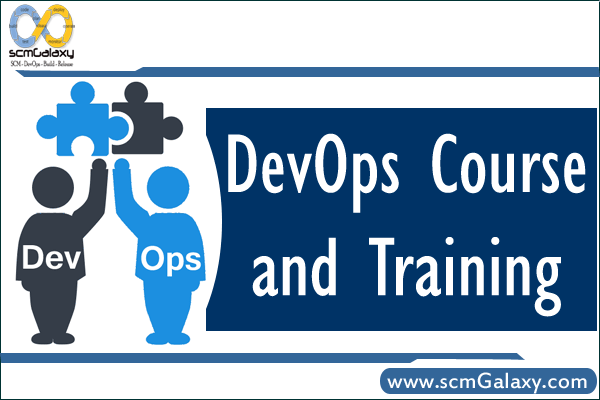

In this course, we look at the necessity of Devops and how a DevOps transformation can help focus on value and streamlined delivery of your software. We will also cover concepts like Automation, tools & technology which play huge roles in DevOps success;
- Understand the need for DevOps and the problems it resolves.
- Learn about the common Infrastructure Servers, Scalability and Availability
- Implement Automated Installations and Deployments
- Understand Performance and basic Security for Infrastructure
- Implement Virtualization Concepts
- Understand the need and concepts of Monitoring and Logging
- Understand the Continuous Integration and Deployment (CI/CD)
- Learn various DevOps tools Chef, Puppets, Jenkins, Nagios, Docker, GIT, etc
- DevOps Engineer
- Build and Release Engineer,
- AppOps Engineer,
- Site Reliability Engineer
- System Administrator
- Operations Engineer
- Automation Engineer
- DevOps Engineer
- Build and Release Engineer,
- AppOps Engineer,
- Site Reliability Engineer
- System Administrator
- Operations Engineer
- Automation Engineer
- Project Managers,
- Testing Professionals,
- Software Developers and Architects,
- Basic understanding of linux/unix system concepts
- Familiarity with Command Line Interface (CLI)
- Familiarity with a Text Editor
- Experience with managing systems/applications/infrastructure or with deployments/automation
- info@scmGalaxy.com
- +91 700 483 5930
- skype – scmGalaxy
We do offer classroom training and workshop in Bangalore, Hyderabad, Pune, Mumbai and New Delhi. For more details, please send us an email to info@scmGalaxy.com
Also, you can follow this url Click Here
With Lifetime Enrollment
INR 25K
- Technical benefits: Continuous software delivery
- Technical benefits: Less complex problems to fix
- Technical benefits: Faster resolution of problems
- Business benefits: Faster delivery of features
- Business benefits: More stable operating environments
- Business benefits: More time available to add value (rather than fix/maintain)
- 30 Hours instructor led online class
- Hands on Approach – We emphasize on learning by doing.
- Life time free re-enrollment to future DevOps courses
- Life time free access to all learning materials including
- Class recordings
- Presentations
- Sample Code
- Projects
- Total Lab Infrasture in cloud and 24×7 available
- 70% of the class is consist of Lab
- Each week assignments (total 4) with personal assistance
- Two real time senario based projects with standard evaluation
- 24×7 online support to queries during and after the course completion
- 1 dedicated class for Interview preparations
- Online Quizs for each tool
- Lifetime Free access to Our Learning Portal for FreeVideos, Scripts Collection, Quiz, Interview Guide, Projects, Tutorials etc.
- Two Courses One Fee – DevOps and Build & Release which includes Chef and Puppet courses are together is being offered to our students.
- Life time Enrollment – Once you enroll, its life time enrollment. That means you can attend any number of session, Any Batch, Any time without paying another time for DevOps, Build & Release, Chef and Puppet. That means all courses, only one fees for life time.
Agenda of the training: DevOps Concept and Process
- Continous Integration and Delivery Process
- Problem That DevOps Solves
- Explore the DevOps background, approach, and best practices
- Integrate test automation with DevOps
- Implement continuous testing
- Learn how DevOps practices and principles improve software quality and efficiency
- Understand the differences between DevOps and traditional operational methodologies
- Discover the major steps required to successfully implement delivery pipelines
- DevOps Transition to a Project
- Understanding the Continuous Integration and Deployment (CI/CD)
- Implement DevOps – Organization & Culture
Agenda of the training: Tools and Technologies
DevOps Concept, Foundation, Culture, Best Practices and Learning
- Problem That DevOps Solves
- Implement DevOps – Organization & Culture
- Continous Integration and Delivery Process
- Explore the DevOps background, approach, and best practices
- Integrate test automation with DevOps
- Implement continuous testing
- Discover the major steps required to successfully implement delivery pipelines
- DevOps Transition to a Project
Operating Systems
Windows
Linux (CentOs & Ubantu)
Version Control Management Tools Using
Git
Build & Lifecycle Management Tools Using
Maven
MSBUILD
Gradle
World of Application Packaging Tools with
Nuget
YUM
APT
Virtualization and Container with
Docker
Vagrant
Static Code Analysis using
SonarQube
Test Coverage using
Jacoco
Cobertura
Incident and Task Management System
Jira
Configuration Management, Automation & Deployment Tools Using
Chef
Puppet
Continuous Integration & Delivery Using
Jenkins
Understanding the Cloud Infrastructure with
Amazon AWS EC2
Server Monitoring Tools with
Nagios
Programming and Scripting with
Bash Scripting
Ruby Fundamental
I’m a DevOps/SRE/DevSecOps/Cloud Expert passionate about sharing knowledge and experiences. I am working at Cotocus. I blog tech insights at DevOps School, travel stories at Holiday Landmark, stock market tips at Stocks Mantra, health and fitness guidance at My Medic Plus, product reviews at I reviewed , and SEO strategies at Wizbrand.
Please find my social handles as below;
Rajesh Kumar Personal Website
Rajesh Kumar at YOUTUBE
Rajesh Kumar at INSTAGRAM
Rajesh Kumar at X
Rajesh Kumar at FACEBOOK
Rajesh Kumar at LINKEDIN
Rajesh Kumar at PINTEREST
Rajesh Kumar at QUORA
Rajesh Kumar at WIZBRAND

 Starting: 1st of Every Month
Starting: 1st of Every Month  +91 8409492687
+91 8409492687  Contact@DevOpsSchool.com
Contact@DevOpsSchool.com

